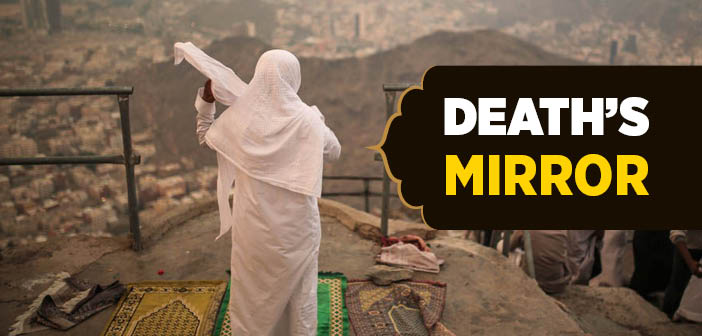Whose corpse will not rot in the grave? What is the unspoile in grave in islam?
Allah created humankind from the earth[1] and nurtures them with sustenance from the earth throughout their lives. When they die, they will again return to the earth:
Allah, glory unto Him, declares:
“From it (the earth) We created you, and to it We will return you, and from it We will bring you forth a second time.” (Ta Ha, 20:55)
This demonstrates that the human body is by nature doomed to mortality. As physical constitution is earth matter, bodies will transform into earth matter once again in the grave; that is, they will return to their essence and source.
However, Allah Almighty will preserve the bodies of some of His servants in the intermediate realm of the grave as an exceptional favour bestowed upon them. The Prophet s are first and foremost in this regard.
Indeed, as narrated by Aws ibn Aws (may Allah be well pleased with him) the Messenger of Allah (may Allah bless him and grant him peace) said:
“The most excellent of your days is Friday. Therefore, invoke peace and blessings upon me abundantly on that day, for your invocations are presented to me.”
The companions then asked: “Messenger of Allah, how will our invocations be presented to you once your body has turned to dust?”
The Messenger of Allah (may Allah bless him and grant him peace) then described Allah’s special favour upon his Prophet s and Messengers in the following words:
“Allah, glorified and exalted be He, has prohibited the earth from consuming the bodies of the Prophets.” (Abu Dawud, Salat, 201/1047, Witr 26; See Nasa’i, Jumu’ah, 5)
In another narration, he says:
“Your invocations are presented to me even after my demise, for Allah has forbidden the earth to consume the bodies of the Prophets. The Prophets of Allah are alive and receives provision.” (Ibn Majah, Jana’iz, 65)
There are also anecdotal reports concerning the preservation of the bodies of the Prophets. In our recent history for instance, during the construction of the Dicle Dam, which provides irrigation to a large section of the Diyarbakir Plain, the graves of the Prophets al-Yasa’a (Isaiah) and his paternal cousin Dhu’l-Kifl (upon them both be peace) were transferred, to prevent them from being submerged in water. During the transfer, the graves of these two Prophets, reportedly 3,200 years old, were disinterred and transported to new graves on a nearby hill. Those who carried out the transfer report that the bodies of both Prophets were as though they were sleeping.[2]
Another group of people whose bodies will not be consumed by the earth are those who were killed in the way of Allah. As a matter of fact, even today there are cases of bodies of the deceased in various places that remain unspoiled in their graves.
It is stated in the Qur’an:
“Do not suppose that those killed in the Way of Allah are dead. No indeed! They are alive and well provided for in the very presence of their Lord, delighting in the favour Allah has bestowed on them, rejoicing over those they left behind who have not yet joined them, feeling no fear and knowing no sorrow…” (Al ‘Imran, 3:169-170)
The life of the Prophet s is without a doubt far superior to that of the martyrs.
Apart from the Prophet s and the martyrs, the bodies of the righteous, whose hearts are full of the love of Allah and His Messenger, who avoided the unlawful and doubtful throughout their lives and who exhibited elevated servitude to Allah in piety and God-consciousness, are also perfectly preserved in the earth. This has been proven time and time again through written accounts and eyewitness reports. A few examples from the Age of Happiness are as follows:
When the wall of ‘A’isha’s chamber collapsed during the time of al-Walid ibn ‘Abdalmalik, they began rebuilding it and a foot appeared. They were alarmed, thinking it to be the blessed foot of the Messenger of Allah (may Allah bless him and grant him peace). No one could be found who knew anything about it until ‘Urwa ibn Zubayr (may Allah have mercy on him) said to them, “No, by Allah, it is not the foot of the Messenger of Allah (may Allah bless him and grant him peace). It is the foot of ‘Umar.” (Bukhari, Jana’iz, 96)
Jabir ibn Abdullah (may Allah be well pleased with him) relates:
“When the Battle of Uhud approached, my father called me during the night and said, ‘I think that I will be among the first of the companions of the Messenger (may Allah bless him and grant him peace) to be killed. I’m not leaving behind me anyone dearer to me than you, except for the soul of the Messenger of Allah (may Allah bless him and grant him peace). I have debts, so repay them and always treat your sisters well.’
In the morning, my father was the first to be killed and was buried with someone else in a grave. I was not comfortable leaving him in the same grave as another, so I disinterred him six months later. And he was just as he had been on the day that I had buried him, except for a small place on his ear. I buried him in a grave on his own.” (Bukhari, Jana’iz, 78)
Such is the extraordinary state of the righteous Muslims.
Another example from our recent history of the bodies of such righteous servants of Allah is that of an esteemed Muadhin (caller to prayer) from Adana in Turkey, who also had memorised the entire Qur’an. The saint Mahmud Sami Ramazanoğlu (may Allah purify his secret) was one of those who personally recounted the story of the disinterment of precisely such a person who had memorised the entire Qur’an and passed away in Adana. Thirty years after his death, a road was being built which cut through his burial site, obliging his grave to be dug up and relocated. Sheikh Mahmud Sami witnessed firsthand that the body was perfectly preserved and amazingly, even his burial shroud was in perfect condition.
This event is also an indication of the fact that those who memorise the Qur’an (huffaz) who are dedicated to leading their lives in accordance with it will receive many Divine gifts and favours in this world and in the Next World.
[1] ” Among His Signs in this, that He created you from dust…” (30:20).
[2] For details, see Altınoluk Dergisi, July 2014, Issue 341, p. 48.
Source: Osman Nuri Topbaş , Journey To Eternity, Erkam Publications





